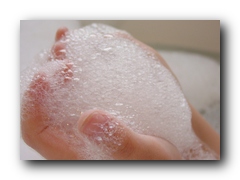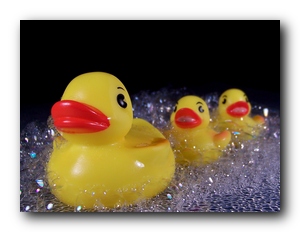|
Slippery Soft Water, I Can't Get the Soap Off!This has to be the most common misconception with soft water. Fact: With soft water the soap rinses off immediately. Fact: With hard water you will have a soap residue left on your skin. Irony: With soft water, your skin feels slippery leading you to believe that there is soap left on your skin when there's not. If you have a water softener salesperson come to your home he/she will probably show you a demonstration that will amaze you. I wish I could do it for you right now but the best I can do is describe it to you. If you have a hard time believing this, all you have to do is invite a salesperson to your home and ask to see it for yourself. This demonstration will allow you to see for yourself that soft water does not leave soap behind; and hard water does. The salesperson will draw a sample of hard water from your kitchen sink into an Erlenmeyer (pear-shaped) flask. He will then connect his portable water softener to your sink and draw a sample of softened water into another flask. With the same amount of water in both flasks he will add an equal number of drops of greensoap to each flask. Greensoap is used because it is a very simple soap with no sudsing solutions added. Think of it as a liquid form of an Ivory bar soap which is 99% pure soap. When the flasks are shaken you'll see an impressive amount of suds in the soft water flask. You'll also note that the water below the suds is perfectly clear. The hard water flask won't have any suds at all, and even worse, the water is gray and cloudy with flaky stuff floating in it. This flaky stuff is the difference in soft water plus soap and hard water plus soap. The flaky stuff is soap curd. It's a natural reaction of the soap and the calcium in hard water. You've seen it before and maybe didn't realize it.
 The salesperson has another demonstration to prove this to you. He/she will have you wash your hands in a stream of soft water provided by the portable softener. You will use a small bar of Ivory soap. Ivory is soap; it doesn't have all of the chemicals found in other bar soaps that are added to chemically soften the water. Once your hands are lathered you will rinse them off, one at a time. One hand gets rinsed with soft water while the other gets rinsed with your tap water. Once your hands are dried you'll be asked to lick the back of each hand. Which one tastes like soap? When I was younger, before I had soft water in my home, I had many battles with dandruff. I tried all kinds of concoctions to stop my head from itching. In 30 years of having soft water I haven't had a bit of trouble with dandruff. Sometimes when I'm away from home I'll start getting the itchiness after a few days of hard water, but not the problems I had before. I can only imagine that I must have had soap curd on my scalp for all those years, no wonder it was itchy. OK, if it's not soap, then why is my soft water so slippery? Return from I Can't Get the Soap Off to How To Purify Water
|

